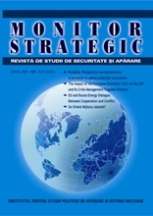The Impact of EU Member States’ Foreign Policy on Developing the European Defence Policy
The Impact of EU Member States’ Foreign Policy on Developing the European Defence Policy
Author(s): Dorin Alin GalSubject(s): International relations/trade, Security and defense, Military policy, EU-Accession / EU-DEvelopment
Published by: Editura Militară
Keywords: European Union; Common Foreign and Security Policy; Common Security and Defence Policy; political integration;
Summary/Abstract: In the 21st century, the term “security” has taken on a multidimensional meaning, in accordance with the wide number of emerging technologies, trends and threats that are influencing the international environment. Over the last 20 years, modern geopolitical issues have always existed in the background of age-old issues: poverty, wars, diseases and environmental disasters. Today, the global security agenda is forced to take all of these elements into account, together with new ones such as climate change. In this context, the European Union’s effort to assert itself as a relevant security actor has come both of a desire to remain relevant in current international talks, as well as a need to adapt in order to continue the expansion of its values and members. However, when predominating national interests would have to give way to a European common good, member states continue to generally opose such an outcome. At the EU level, the intention to become a strong and viable security actor has manifested itself through a strong focus on the two efforts which would make it so: the Common Security and Defence Policy (CSDP) and the Common Foreign and Security Policy (CFSP)*. In the international community, the extent to which this desire has developed into an actual role in formulating international security policies is still debatable, although the Union’s influence has been easier to observe after Russia’s unjustified and illegal invasion of Ukraine. As the world adapts to the new status quo and the realities of the war in Ukraine, EU member-states are starting to revert to real-politik choices made with national concerns in mind. This, in turn, can hurt EU policies that require closeness and cohesiveness in areas such as multilateral defence and security. Thus, the purpose of this paper is threefold: to recount the steps that were taken in the common security and defence area so that the Union can get to where it is today; to underline the influence that member states can have in regards to the EU’s efforts to better consolidate and coordinate its defence policy, as well as the need to avoid member states following their own national interests that could be detrimental to the organization; to provide some ideas and possible actions in regarding to steps that might be taken to ensure the European Union does not only keep developing its Common Foreign and Security policies, but also takes steps to ensure all member states are on the same page and are equally involved in achieving the EU’s defence goals.
Journal: Monitor Strategic
- Issue Year: 2023
- Issue No: 1-2
- Page Range: 32-38
- Page Count: 7
- Language: English

